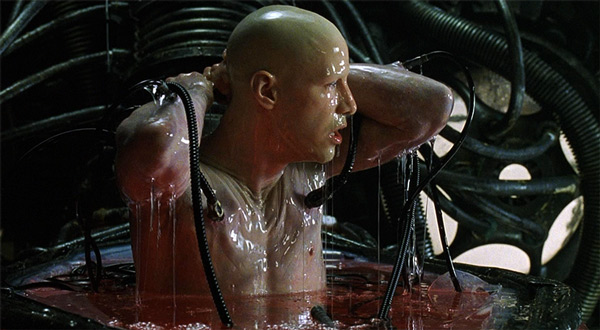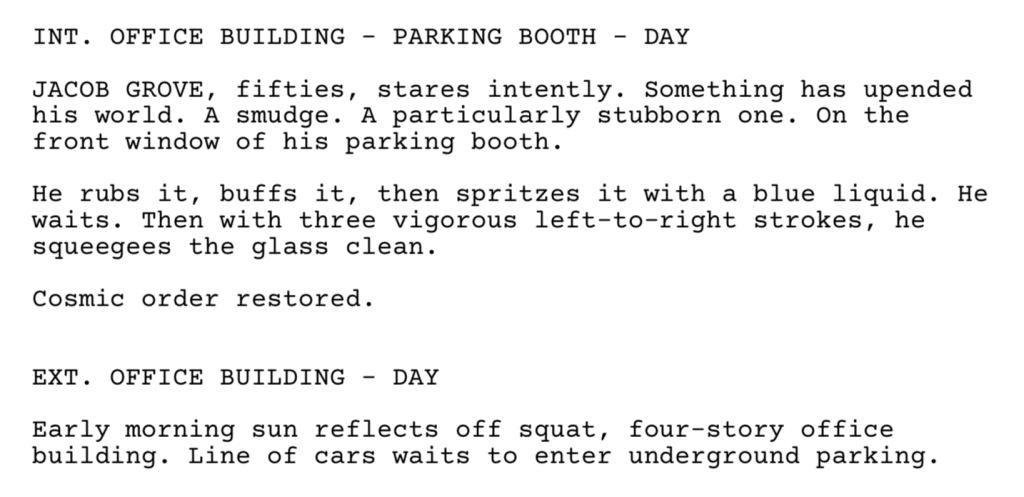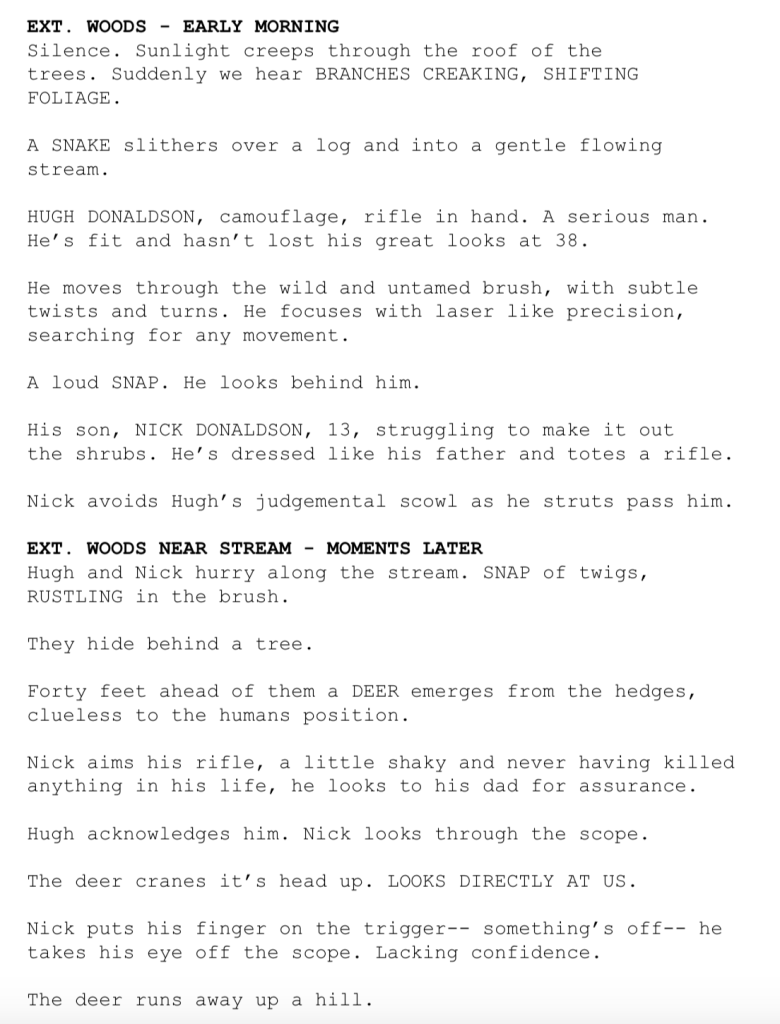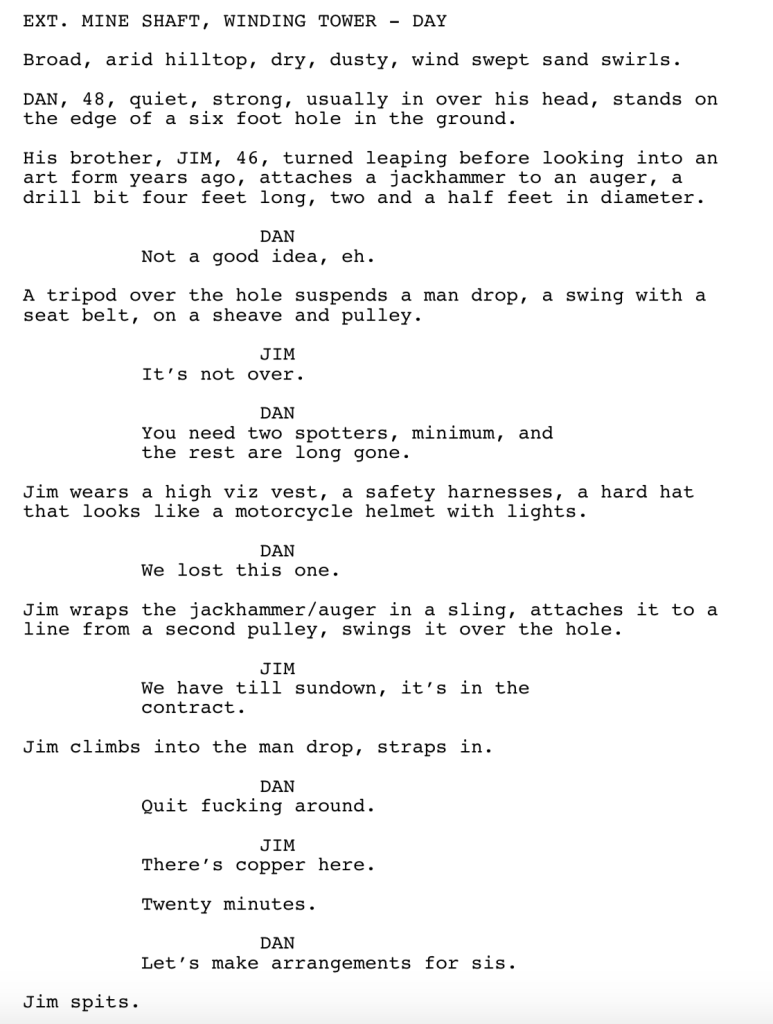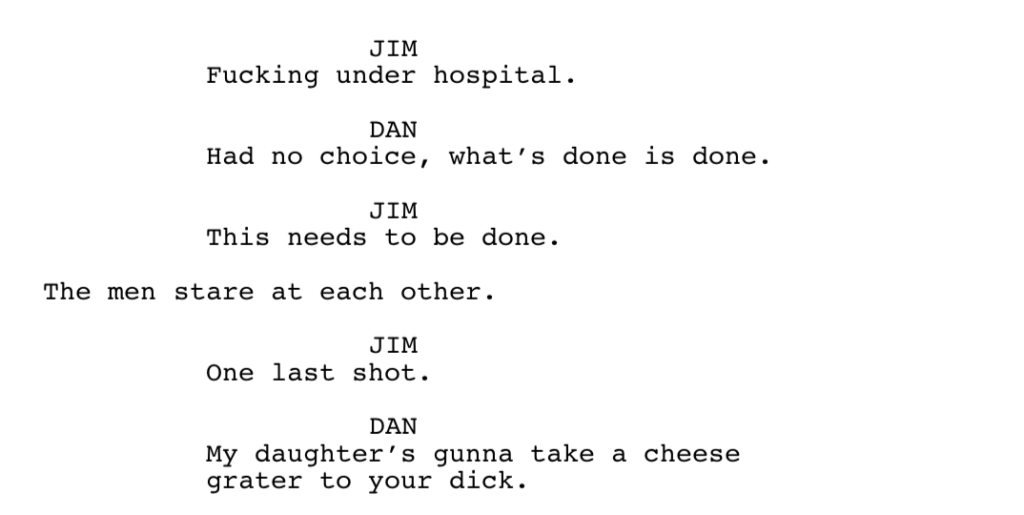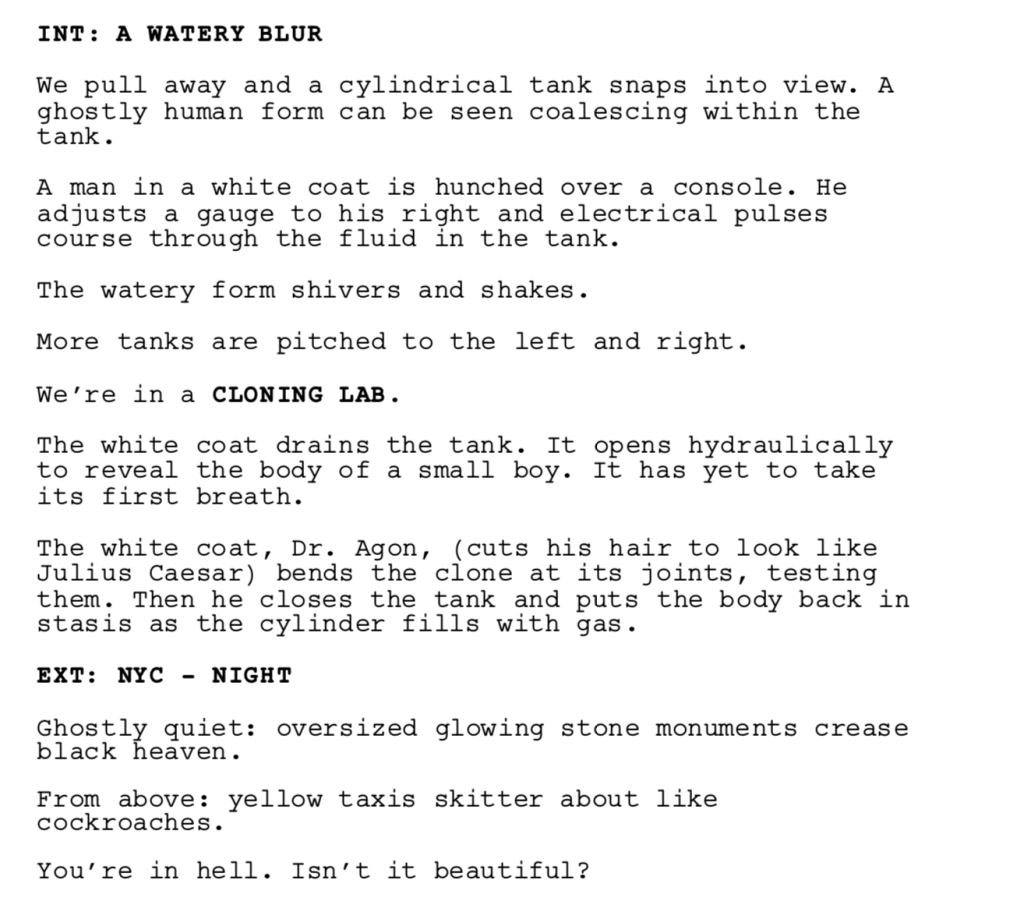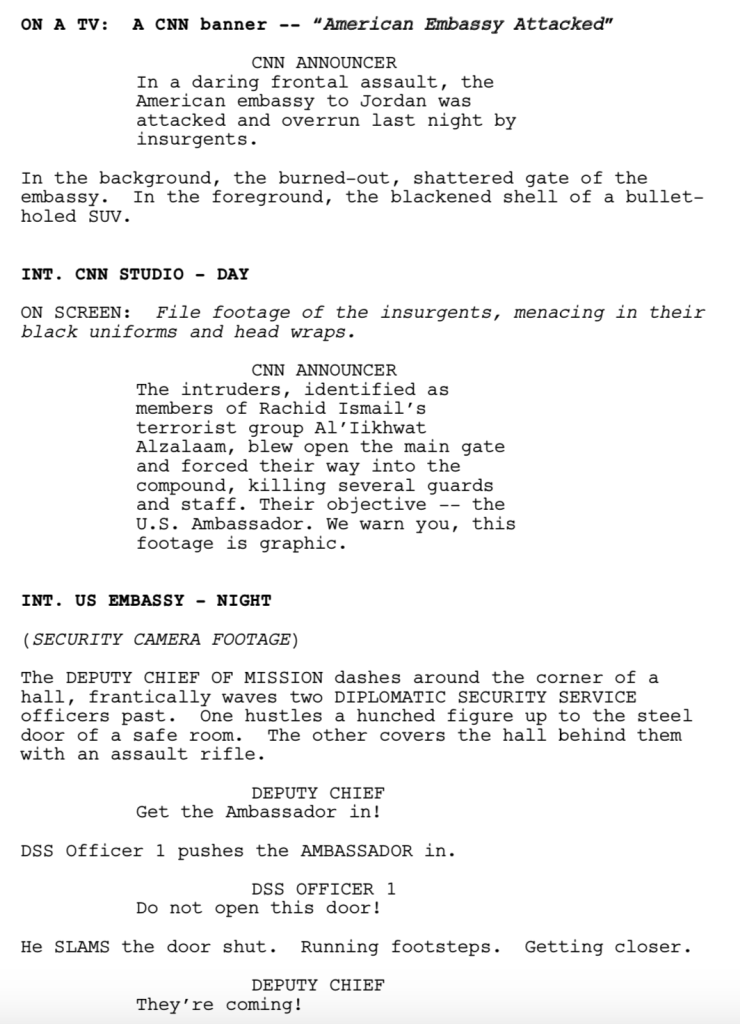Today I encountered something I never thought in a million years I’d read… the female Fight Club.
Genre: Thriller
Premise: (from Hit List) On the night of her 30th birthday, Elizabeth accidentally comes into possession of a very special item…a severed toe. She soon finds herself obsessing over the toe’s owner and, desperate to shake up her own mundane life, must decide whether or not to give in to the darker impulses the toe has stirred within her.
About: Mallory Westfall was nominated for Tisch’s (USC) Oliver Stone Screenwriting Award with her script, Begotten. She has since been a staff wrier on Syfy’s horror series, Channel Zero. She currently works as an executive story editor on AMC’s Fear The Walking Dead.
Writer: Mallory Westfall
Details: 128 pages
Man, for all you Scriptshadow readers yet to graduate high school, I highly recommend going to NYU’s Tisch or USC’s School of Cinematic Arts. I’ve seen a TON of Hit List and Black List writers who attended one of those two schools.
A lot of people ask me if it’s worth going to college for film or screenwriting. If you can get into Tisch or USC, hell yeah. Not only do you get screenwriting teachers who’ve actually worked in the business. But if you can get into one of these schools and network your ass off, meeting and befriending as many people as possible, you will work in this business, one way or another, for the rest of your life.
The irony of today’s script is that it’s nothing like the stuff that usually comes out of these schools. While there is some level of structure present, it’s hardly what you’d call a tight script. For the first half of the screenplay, I had no idea where it was going. Every time I thought, “Oh, it’s THAT kind of movie,” it would change into something else. After awhile, I got frustrated. “What is this???” And then I figured it out. I was reading the female Fight Club.
Elizabeth is turning 30 tomorrow, which sucks because her life’s lame. Turning 30’s fine when everything’s on the upswing. But when you’re stuck in a dead end office job and everyone around you can barely remember your name, it’s no fun.
One day after work, Elizabeth is driving home, and the back door of the truck in front of her bursts open, giving her a view of an entire group of people tied up. One woman in particular, with purple toe nails and a moose tattoo on her leg, locks eyes with Elizabeth. Quickly, a man inside the truck slams the door closed, but not before something flies out of the truck and slams into her windshield. It’s a toe! A toe with purple nail polish!
Elizabeth takes the toe home and begins to worship it. Strangely, it begins to bring her confidence. She starts standing up for herself at work, even swearing in front of her co-workers! Elizabeth becomes obsessed with the toe’s owner, and begins investigating who she might be. This leads her to a mysterious bus stop (which happens to be right across the street from her apartment) where she’s picked up and taken to a warehouse. There she’s terrorized by men in masks who threaten to kill her.
Just when it looks like it’s over, Elizabeth is told that this place isn’t some twisted hellhole, but actually a company where people pay to have the shit scared out of them. The idea is to be “woken up,” jolt your mind so that you start appreciating life again. Invigorated, Elizabeth continues her hunt to find the mysterious, now toe-less, girl. Eventually she meets her at a party for people who have been through the company torture experience, and befriends her.
Keesiah loved her experience with the company but didn’t think they went far enough. So she recruits Elizabeth to give people an even more life-rattling experience, with one twist: They don’t sign up for it. Elizabeth is so obsessed with Keesiah at this point that she goes along with it. But she soon realizes that Keesiah is not mentally sound. And that if she doesn’t do something to stop her, Keesiah will end up killing someone.
I’m torn over this script. On the one hand, it’s weird as hell. On the other, we need more weird scripts like this. This is exactly what’s been missing from The Black List. These used to be on the Black List all the time. But with everyone writing biopics these days (it’s only a matter of time before someone writes a biopic about the person who invented the biopic), there aren’t as many slots for offbeat material like The Toe. So while I have problems with The Toe, I’m happy Westfall wrote it.
The first problem I have is that this script is waaaaaaaaay too long. 130 pages? For a script about a severed toe? Come on. That’s the screenwriting equivalent of a hostage situation. And you don’t have to be Stephen Hawking to figure out why the page count is so high. It takes Westfall 10 pages to establish that Elizabeth is introverted and friendless. Established screenwriters can achieve that in 3 pages with their eyes closed. All you need is one quick scene at the office where it’s clear nobody hangs out with Elizabeth and you’re done.
Whenever I see slow opening pages, I know I’m in for a long read. The opening pages should move the fastest, not the slowest. Get us into the story as soon as you can. After that, the script sort of wanders into this strange romantic relationship between Elizabeth and her toe. This section was also slow. The same beats – Elizabeth needing to be around the toe – were repeated over and over again. Good lord. Screenwriting Rule 8a: Don’t repeat the same beats!
Yet strangely, I wanted to keep reading. The main reason being I had no idea where this was going. Was Elizabeth going to enter into a relationship with the toe, like that movie Lars and the Real Girl? Then later, when she was kidnapped, were they going to kill her? Then later, when she realized it was a company, was she going to expose them? Join them?
It was enough to get me to the point where Keesiah entered the picture. And that’s where the story officially picked up. Once you have a psycho in your script, people are going to keep reading if only to see what that psycho is capable of. It’s no different from Tyler Durden in Fight Club. What was this guy up to? What was he going to do next? A major reason for that movie’s success was the curiosity surrounding that character.
Still, The Toe could’ve been so much tighter. We literally don’t meet Keesiah until page 68. PAGE 68! That’s nuts. We should’ve met her by page 45. Page 55 at the latest (midpoint of a 110 page script, which is what this should’ve been). What happens when you introduce a main character that late is you have to cram their storyline into a much tighter space. If you meet her early, you have time to build up her character, lay out her story, give the character the time they deserve. When does Tyler Durden arrive in Fight Club? By the end of the first act, right?
Then again, there are no rules in this business. If you want to linger, you can linger. If you want to introduce characters late, you can introduce characters late. An argument can be made that that’s why this script was so interesting. The late-arriving plot points kept you wondering where all of it was going. I’m just not convinced that was the plan. I suspect it might have happened by accident.
Still, this was weirdly entertaining. I give it to Westfall for trying something different.
[ ] What the hell did I just read?
[ ] wasn’t for me
[x] worth the read
[ ] impressive
[ ] genius
What I learned: One of the laziest devices you can use to get your hero out of a complicated situation is to have them hit their head and pass out then cut to later. Late in the script, when Keesiah is making Elizabeth help her sever the fingers of one of their victims, Elizabeth tries to stop her, the two scuffle, and Elizabeth falls, bumps her head, and passes out. This allows the writer to cut to later, with Elizabeth waking up and asking Keesiah what they did. Please writers, STOP DOING THIS! I have lived an entire life without ever seeing someone fall down, hit their head, and pass out. Yet if you read the screenplays I read, you’d think it was a daily occurrence in every single person’s life. If you ever make your character hit their head and pass out, ask yourself if it’s an organic action that makes sense for the story or if you’re just being lazy. If it’s the latter, go back and rewrite it.
Genre: Dramedy
Premise: After receiving the news that her show is being canceled, a prickly female talk show host goes back into the writer’s room for the first time in years, where she finds inspiration from a young female comic who’s just joined the staff.
About: Sundance! Which means lots of movie sales. This film just debuted at the festival, fetching one of the biggest sales ever – Amazon bought it for $13 million dollars. I confess that I’ve never understood what these sale prices mean. The movie itself probably costs $13 million to make. So does that mean they’ve simply broken even? Cause I’m assuming once Amazon buys it, they take all the profits. Who knows. Anyway, the movie stars Mindy Kaling and Emma Thompson. It will likely be marketed similarly to Amazon’s The Big Sick. The script originally appeared on the 2016 Black List.
Writer: Mindy Kaling
Details: 131 pages! Yikes!
The fact that I liked today’s script says a lot. Because I don’t like Mindy Kaling’s comedy. In fact, to demonstrate how little I like her comedy, I’ve been watching old Office reruns on Netflix and every time she comes on, I fast-forward, even though it takes more time to go through the process of fast-forwarding than had I just let her say her joke. It goes to show that if you write something good, you can overcome anyone’s bias. Cause my bias was strong on this one. Strong like bear.
Ice Queen British import Katherine Newbury is a staple of late night American talk shows. At one point, she was the best in the business. However, things have gone astray. Katherine is so on auto-pilot that she doesn’t even know the names of her writing staff. In fact, when she comes down to talk to the staff in one of the script’s early scenes, she asks where John is. “John died in 2012” someone informs her. Yeah, it’s that bad.
Meanwhile, 30-something Molly Chaterjee is attempting to move out of her boring chemical managerial job into comedy. It just so happens that Katherine is trying to spice up her all-male writing staff and so informs her producer to hire a woman. Molly lucks out in that she’s the first interview and gets hired basically because the producer is too lazy to interview anyone else.
As this is happening, Katherine gets word from corporate that this will be her last year on the show. Her ratings have been in decline for awhile now. But, more importantly, her heart hasn’t been in it. All of a sudden, Katherine realizes how much she needs this job and sets out on a course to win it back at all costs. She does this by doing unheard of things such as being present in the writer’s room. This is where she runs into Molly, who clearly has no business being here. She has no experience and no understanding of how even the most basic aspects of joke-writing work.
However, Katherine soon realizes that her all male staff is pitching the same jokes that they’ve always pitched, which are the same jokes that the all-male staffs from all the other late night shows pitch to their bosses. Molly, meanwhile, is encouraging Katherine to start talking about her personal life. When she talks about things she cares about, she shines. Katherine listens, gives the advice a shot, and, all of a sudden, her show becomes hot again.
Unfortunately, just when it seems like her career is saved, one of Katherine’s adversaries leaks something to the press that’s been rumored forever. Katherine has spent the last two decades sleeping around, cheating on her husband. Realizing she’s toast, Katherine prepares to hang it up. That is until Molly challenges Katherine to address the scandal in a monologue. If she’s open, honest, and finally lets her guard down, she just might be able to save her career, and the show.
I have a theory about this script. I think Katherine was originally a male character. It seems unlikely that you would conceive of an older female British talk show host in the U.S. We don’t have any precedent for that here. And this was obviously inspired by the David Letterman cheating scandal. So I believe the character was originally a man and, at some point, Kaling changed it to a woman.
I don’t know why she did this. But it was a critical change. It turned what would’ve been an okay story into something great. Just the scandal element alone is more complicated when the character is a woman as opposed to a man. It was such a successful choice, in fact, it should act as a reminder to writers to always challenge their original conceptions of a character. Not just whether they’re a man or a woman. It could be gay or straight. It could be aggressive or passive. It could be fun or serious. That one change could be the thing that ignites the character and turns them into something special. And there’s a reason for that. Our minds think logically. We set characters up the way they’ve always been set up. A late night male talk show host. Of course. That’s how they all are. It’s only when you go against the norm that the character becomes unique.
Moving on with the rest of the script, Kaling is attempting to do something tricky here, which is to craft a two-hander. There isn’t one protagonist in this movie. There are two. And despite how easy she makes it look, I warn writers to tread these waters carefully. Everything about the structure of your screenplay becomes more complicated when you go the two-headed protagonist route. For example, the inciting incident of this script happens on page 30. That’s when Katherine is told she’s losing the show. Why does it come on page 30 instead of page 15, where it traditionally shows up? Because Kaling has to set up two main characters instead of one. So it takes twice as long.
Now Kaling is a good enough writer where we don’t feel that extra time. But most amateur writers don’t yet have the skills to keep us invested for that long before a major plot point shows up. Kaling starts us with with a strong opening scene where an underdog female comic does standup for a tough crowd. The suspense and build-up to her routine was perfectly executed. We wanted to stick around to see how she was going to do. If you’re good at writing suspenseful scenes and setting up characters in compelling ways, then maybe you can pull this off. But I’d still recommend nailing a single-protagonist screenplay first. That’s hard enough.
This is a good one, guys. If you’re struggling with character, I would read this script pronto. It’s very character-driven. We’ve got characters with flaws (Katherine refuses to open up), with backstory (Molly comes from an unexpected background), and, most importantly, the characters are trying to figure themselves out. It’s not just about getting to the next plot point. It’s about battling inner obstacles that keep us from being what we want to be. When you explore humanity that honestly, your screenplay will rise above the typical fare that dominates this town. Very impressed with this.
[ ] What the hell did I just read?
[ ] wasn’t for me
[ ] worth the read
[x] impressive
[ ] genius
What I learned: Plot Points vs. Character Points. Screenwriters are often slaves to their plot. All they care about is getting to the next plot point. “I have to get to the part where they fire her! That’s what keeps the plot moving.” This is a good mentality to have. But don’t forget to add character points as well. A character point is something that happens to your character that isn’t necessarily tied to the plot, but it adds depth to both your character and the story. For example, after Katherine learns that she’s getting fired, she comes home to her elderly wheelchair-bound husband’s daughter, who demands that they get home care for him. It’s the last thing she wants to deal with right now but the fact that this “real life moment” is happening tricks us into believing this is a real person experiencing a real life. When you’re a slave to plot points and never introduce these character moments, your script feels thin and empty. I know this because I read those scripts all the time.
Genre: Horror
Logline: Trapped by a blizzard in a remote truck stop as it burns to the ground, a recovering addict and her young daughter must fight for survival against an alien horror
Why You Should Read: I hope everyone has room for holiday leftovers as this is my version of a Christmas story. There are some holiday family film tropes, but with minor deviations. When some travelers get stranded at a mountain truck stop during a brutal blizzard, they don’t discover the real meaning of Christmas or the importance of family. There’s no time for any of that treacle when you’re cowering in pants-filling terror. Unfortunately, the nocturnal visitor isn’t Santa Claus. It’s a grotesque alien creature that interrupts the festivities in a grisly way. The young child isn’t slumbering with visions of dancing sugarplums in her head, the reality is that she’s doing something very disturbing in the storage room. There’s no Yuletide log burning, instead the whole damn place catches fire. A goodhearted mall Santa is present, but he dies a horrible death, poor bastard. Where eggnog is the disgusting holiday beverage that is typically consumed, in this story the monster liquifies the internal organs of its paralyzed prey and slurps the bloody puree like some ghastly smoothie. (which is nearly the same drink, in my opinion) I appreciate anyone who takes a peek at the script and am grateful for any comments/notes. Thanks.
Writer: Jeff Debing
Details: 109 pages
Monster in a box.
It’s the oldest movie setup in the world.
I’d go so far as to say if you write a monster in a box screenplay, you increase your chances of selling that screenplay by a thousand percent. The genre will always be one of the easiest to market.
But there are a couple of catches to writing one of these scripts. First, your angle must be somewhat original. There has to be SOME element of “I haven’t seen this before.” And second, your execution needs to be on point. This setup is so ubiquitous that if you’re executing it by the numbers, it’s going to feel like every other monster-in-a-box movie.
Does It Drinks You pass this test? I’ll let you know in a minute.
Allison Evans is just now recovering from a pain medication addiction that was the result of a nasty car crash where her husband was killed. She’s heading up to the snowy mountains where her father-in-law, Dick, runs a truck stop diner/motel. Dick has been taking care of Allison’s daughter, Cordelia, while Allison went through rehab. Allison’s finally going to get her daughter back.
While this is going on, Zachary Yates, a young soldier, is escorting his superior, Will Venton, with a truck full of top secret canisters. The further both parties get into the mountains, the snowier it gets. Soon after Allison’s car gets caught in a snowdrift, Venton’s truck comes up behind her, sees the obstacle at the last second, swerves, and the truck goes plummeting down a hill.
Allison runs down, gets the injured Yates out, and the two carry a comatose Venton back up to her car, which they’re able to get started again and drive up to Dick’s Truck Stop. Once there they call 911 to come get Venton, but it doesn’t look like anyone’s going to be able to drive here until morning. Meanwhile, a reluctant Dick makes it clear he sees Allison as an addict and doesn’t want her taking care of his granddaughter.
While this is going on, some sort of creepy spider (called a “Spiderlike”) crawls out of Venton’s mouth. The Spiderlike creature operates by spitting venom into your body, turning your innards into liquid, and then drinking them. Yummy. Unbeknownst to anyone, the Spiderlike begins creeping around and killing the truck stop folks one by one, growing bigger with every kill.
Unfortunately for Yates, everyone thinks he’s the one killing people, forcing him to play a game of hide and seek around the truck stop. It isn’t until well into the story that Dick and the truckers realize that it’s a really creepy spider killing everyone. But by then, it’s too late. The Spiderlike is lining up his kills like a good bowler lines up pins. Since it’s too cold and dangerous to flee, it will be up to Allison and her terrified daughter to kill this nasty creature.
It Drinks You passed!
Okay, I wouldn’t say I needed to keep reading (that’s my ultimate hope for the First 10 Pages Challenge – for someone to write something so captivating that the reader NEEDS to keep reading). But I definitely wanted to.
The script starts with the aftermath of the spider attack. We show up and see this truck stop burned to the ground with only one survivor. I’m intrigued. I want to keep reading. Allison’s introduction also intrigues me: “Despite her wrung-out appearance, her haunted eyes often show a glimpse of determined hope.” What happened to this woman? Then we cut to these military folks preparing to leave their facility with secret canisters. Hmm, what does the military have to do with this situation? Want to keep reading. Very quickly after this we get the car crash. Something is happening immediately. I want to keep reading. By the time we get to the truck stop, we’re 10 pages into the story and firmly invested. Nice job!
In addition to passing the First 10 Pages Challenge, Debing does a great job setting up his main characters – Allison, Dick, and Cordelia. I like that Allison is coming to pick her daughter up from a man who doesn’t trust her. I like that she’s responisble for Dick’s son’s death (in her car crash that brought on her addiction). There’s a lot of meat there, so I know we have more to play with in this story than monsters running down hallways with characters screaming.
Unfortunately, that’s where my praise ends. The second I saw two legs creep out of Venton’s mouth, I thought, “Alien.” And I never stopped thinking that throughout the rest of the screenplay. You’ve got a creature that looks like a spider (which is how the Alien creature starts out) and gets inside of people to kill them. Yeah, the rules are a little different. But I’d argue they’re different in a worse way. The Alien creature has the dramatic climax of bursting out of people when it’s finished with them. The Spiderlike simply craws out.
In addition to that, the central relationship revolves around a mother and a daughter, which, of course, is the central relationship in Aliens, the sequel to Alien. So now I’m just thinking about Alien more.
I also had some problems with the execution. First of all, there’s a manhunt to kill Yates when everyone believes he’s a murderer. But while Dick and the truckers go looking for him, the rest of the characters are sitting around chilling out most of the time. If you think there’s a murderer out there, why is half the group so relaxed?
Even worse is when Allison voluntarily leaves her daughter with someone else. You’ve set this very elaborate backstory up so that this woman is finally reuniting with her daughter. And then she just lets her hang out with someone else, with a crazed murdering soldier out there, no less? It didn’t make sense.
When you have these monster in a box group situations, you have to be careful about splitting people up. I understand that there will be groups within the group. But if you’re going to separate everyone, it’s best to have a scene where someone lays out a plan. One of those, “We’re going to be looking for him here. You guys all need to stay here” talks. You can’t have it so people aren’t communicating when something this dangerous is going on. You need that person who lays down the law: THIS IS WHAT WE’RE GOING TO DO. Ripley is a perfect example of that in Aliens.
Debing is a good writer. You can tell this is written by someone who has been at this for awhile. It’s very professional. He understands how to set up a story and how to keep it moving. He also understands the little things, like how a brief action (Allison trying not to take her prescription pill bottle but ultimately surrendering to it) can tell us a lot about a character. But ultimately this story is too familiar. It’s too similar to Alien.
With that said, I see familiar stuff get made all the time. So I’m not saying this doesn’t have a chance of getting picked up. But I think Jeff needs to rethink his monster so that it doesn’t feel like an Alien clone, and a lesser Alien clone at that. This was the same issue that the dreadful “Life” ran into. They tried to do Alien but with a monster 1/100th as cool as Alien.
Anyway, you’ve got the chops Jeff. Send in something more original for another Amateur Offerings and I’m sure it will do well.
Script link: It Drinks You
[ ] What the hell did I just read?
[x] wasn’t for me
[ ] worth the read
[ ] impressive
[ ] genius
What I learned: Remember that step father and father-in-law situations aren’t the easiest for readers to pick up on. So you have to be clear with them. I thought for a good 40 pages that Dick was Allison’s father. I didn’t know he was her dead husband’s father, which made their relationship so much more interesting (with her being responsible for his son’s death). It would’ve been nice to be clear on that right away.
What I learned 2: Genius move to give Allison burn marks all over her body (from the previous crash with her husband). Actors and actresses freaking LOVE THAT. It’s actor crack. Stuff like that honestly improves your chances of getting an actress attached.
It’s back. Live breakdowns of First 10 Pages submissions! For those of you unfamiliar with the First 10 Pages Challenge, you can go back to the original post here. You can also check out my breakdown of five entries from last week. The short of it is you’re trying to write 10 pages that are impossible to put down. In order to emphasize this, I will stop reading someone’s entry the second I get bored. If that’s the first line, that’s the first line.
Now there have been some commenters who question the point of this exercise. Don’t listen to them. This exercise is one of the most important you will ever learn when it comes to screenwriting. It is teaching you two invaluable lessons. The first is the importance of grabbing the reader right away. And the second is being able to write an un-put-downable scene on command.
I’m hoping today’s analysis helps you understand where a reader might lose interest and why. In case you were wondering, I’m picking these entries at random. I’m not reading through scripts and finding the best examples for my argument. If your pages show up today, use the feedback to go back in and improve them. Or write something better. Most writers never experience this – someone detailing, out loud, why they gave up on a screenplay. So take advantage of it and get better.
You have until Sunday, February 10th, 11:59pm to submit your First 10 Pages. If you’d like to do so, send them to carsonreeves3@gmail.com with the subject line “FIRST 10 PAGES.”
Let’s get started!
The very first thing I read here is a character introduction. However, there’s no character description. Without a description, I’m imagining the most generic version of a man possible. Here’s a description of the main character from yesterday’s Black List script: “Drudge has a twitchy demeanor and horrific posture. He talks with a weird sense of confidence despite a nasally voice and the occasional stutter.” Do you see how big of a difference that makes?
Next, the character’s big action in the first image of the movie is to rub away a smudge. Now I know what the writer is thinking in this moment. He’s using it to tell us something about this character. And that’s a good instinct to have. But it doesn’t matter if the action itself is boring. The second we then cut to a shot of the sun, I’m finished. This is the opposite of immediately capturing our interest. You have to hook us right away. You can’t start with a boring action and follow it up with a static establishing shot.
What is it with writers and the sun? A reposting of Brenklco’s best comment ever: “Pretty sure that a reader who’s had to read thousands of screenplays no longer gives a f&%k what the sun and moon are doing or how they’re doing it.” We also have no space between the slugline and the action lines. Since all screenwriting programs do this automatically, this tells me the writer doesn’t have a screenwriting program, and therefore isn’t as serious about the craft. But even if you’re just broke (which some writers are – I get it), you should still know that you can’t do this.
The good news is, something is happening. We’re moving through the woods. We’re obviously pursuing something. And that’s enough to get me to keep reading. I want to find out what these characters are after. Unfortunately, the second it’s revealed that they’re after a deer, I’m out. I’ve read hundreds of deer-hunting scenes, many of those with a father and a son (and the son usually lacks the courage to shoot). I was hoping for something more exciting and original.
Before I even get to the first line of action, I’m confused. The slugline says this is a “mine shaft” and a “tower.” Aren’t those two different things? One’s underground and one’s way above it? I was literally about to give up on the slugline. But I figured, mine’s are interesting. I don’t encounter them in screenplays that often, so I keep going. I like that Jim is about to do something dangerous. That’s the one thing keeping me reading here. The strange double-space between Jim’s final line of dialogue on the first page throws up a red flag. Dan talks about arrangements for their sister. I’m not sure what that means. What arrangements? Seems strange to bring up now either way. The daughter line with the cheese grater to the dick is a jarring contrast to everything that’s been said so far. It sounds more like a comedy script line. So that’s where I stop.
I’m glad this one came up because it’s a common mistake writers make. The writer here starts out with a scene that has the potential to be interesting. A human is being born artificially. But they don’t do anything with it. All that happens is this clone is born and they’re put into a chamber. That’s not interesting. Think about how Neo is woken up in The Matrix. He’s bald, he’s in this endless tower of clones, a machine comes up and detaches a mechanism from his head, he’s flushed down some tube. Something is HAPPENING in that scene. This is just a quick empty moment of a clone being born. There’s not enough going on to hook us. I’d rather the writer build an entire scene around this than simply showing us a brief non-contextualized moment, a moment that is, quite frankly, one we’ve seen before.
I want to make something clear about this page. It’s fine. It’s completely fine. There’s nothing wrong with it. But that’s not the exercise. The exercise is not to write something that’s fine. It’s to write something that a reader can’t put down. It would make your head spin to know how many scripts I read that start with terrorists doing something. So the second I see that this is another one, I’m already checking out. I can’t figure out if experiencing this through CNN footage is better or worse than experiencing it as it happens, but I don’t think think it matters because this is a garden variety terrorist attack to begin with. If you want to give us a terrorist attack, it has to be a type of attack we haven’t seen before. Or it has to be executed in a way we haven’t seen before. Or preferably both. Another issue here is that no character is introduced. So there’s no one to latch onto and care about. This might as well be CNN on my own television. So again, there’s nothing wrong with this page. But that’s not the goal. You’re trying to blow the reader away. Make it impossible for them to stop reading.
For those wondering, I’ve read about 30% of the entries so far. And to answer the obvious follow-up question: I haven’t made it through an entire 10 pages yet. Mainly because writers are making mistakes like the ones highlighted in today’s entries. Hopefully, this gives you some insight in to how to make your pages better. Get back in there and keep trying!
Genre: Biopic
Premise: The story of how oddball internet reporter Matt Drudge broke the Lewinsky Scandal and nearly took down a presidency, all from a desktop computer in his one-bedroom apartment in Hollywood.
About: Today’s script is the 4th most liked script of 2018. Cody Brotter is a Boston University graduate who’s written for TV, most notably on the show, Comedy Knockout. He also has a podcast, Hollywood Terriers, where he interviews fellow BU graduates in the entertainment industry.
Writer: Cody Brotter
Details: 118 pages
Today we have a totally original screenplay idea that was conceived 100% from someone’s imagination. Just kidding. We have another biopic from the Black List. Writers be working hard on ideas these days. There will come a time – it may be after the Apocalypse with only 20 people left on earth I’m sure – but there will come a time where writers once again attempt to create original stories. Until that time, it’s a biopic world. The rest of us are just living in it.
With that said, if you want to get on Franklin Leonard’s Biopic List, there are two things you can do to improve your chances. One is to find an underdog story. And two is to paint your hero as sympathetically as possible. “Drudge” does both. And once you get past the frustration you feel from having to read another biopic, you realize it does them quite well.
We’re introduced to Matt Drudge through his parents, both staunch liberals who are getting divorced after 15 years. The two are in court for a custody hearing. Except this isn’t your average custody hearing. Instead of the parents fighting FOR custody of their son, they’re fighting to get rid of him. The dad is too busy starting a new family to take him and the mom can’t keep up with Drudge getting in trouble. The judge stares on, flabbergasted. He’s never seen this before.
Cut to a decade later (the early 90s). Twenty-something Matt has moved to Hollywood with no money and managed to beg his way into a Gift Shop job at CBS Studios. When his father flies in for business (not for him), he’s so disgusted by his son’s life, he buys him a computer out of pity. This was right when AOL was sweeping the nation and everyone was talking about getting on this “world wide web” thing.
Little did Matt know, that computer was about to change his life. Through his job, Matt would hear CBS employees gossiping about box office results and who was getting fired, so he started a little newsletter (The Drudge Report), sending this information out to people. It wasn’t long before people began e-mailing HIM to get on the list.
A young conservative named Andrew Breitbart called Matt to meet, and was soon working for him, developing a web page version of the newsletter. The more politically-inclined Breitbart encouraged Matt to include more political news, and that’s where things got interesting. Back then, everyone was still operating by the journalistic rules that had been set up for over a century. You couldn’t just print something. You had to do your “due diligence.” Well, this wasn’t a publication. It was an internet site. So if Drudge got a hot scoop, he could just post it.
A group of young female conservative pundits (pundettes) in D.C. (Laura Ingraham, Ann Coulter, and KellyAnne [soon to be] Conway) recognized they could use this to their advantage. The three were trying to take down Bill Clinton through all of his philandering but the Clinton-loving liberal media were dragging their feet about posting these stories. So they asked Drudge to post them. And he did.
This began a two-front war. The first with the White House and the second with traditional media. You couldn’t just post a story like that, the news networks said. That was… that was… well, you just couldn’t! But Drudge did. And then, when the bombshell story of Monica Lewinsky hit the airwaves and the traditional media still wouldn’t report it (supposedly due to liberal bias), Drudge was all too happy to. And that’s how a little nobody reporter working out of a one bedroom apartment broke one of the biggest news stories in history.
Drudge is a good screenplay mainly because this is a good story. It’s a strange depiction of a person though. I can’t tell if Brotter loves or hates his main character. He starts off painting him with a sympathetic brush. Who’s not going to root for a guy who was abandoned by both of his parents? However, Brotter relentlessly makes fun of his hero’s thinning hair, repeatedly uses the word “creepy” to describe him, and relishes in his lack of friends.
I just don’t understand why you would write a story about somebody you detested. This is why I’m uninterested in seeing Vice. Both Adam McKay and Christian Bale call Dick Cheney the devil. Well if you can’t look at someone objectively, how are you going to portray them accurately?
And yet Drudge works. At least for me it did. Part of that is I went through something similar on a smaller scale. For example, I must’ve received hundreds of e-mails when I started Scriptshadow from people telling me “You can’t do this.” And when I asked them why, the answer was basically, “because it’s always been done this other way.” And I was like, “Well tough cookies. Things are changing.” There will always be resistance to change but, in the end, you can’t change progress.
I do think the script missed some opportunities though. I liked this idea of Drudge’s parents being liberals and Drudge running a conservative website to get back at them. But it’s only casually explored. If Drudge wasn’t actually conservative, but doing this solely to stick it to his father, that would’ve made his character a lot more complex. Maybe with a few more drafts Blotter can explore that angle more.
But by far, the biggest takeaway from this script is the importance of creating sympathy for your hero. You want to do that right away. The cheap way is to have your character give a homeless person a 20 dollar bill (or some do-gooder equivalent of that). Good screenwriters don’t go the cheap route, however. They work harder. Here we create sympathy for Drudge without even meeting him. We see his parents in court trying to pawn him off on each other. Right then, we feel sorry for this guy, and we haven’t even met him yet.
I will continue to rail against biopics. I’m so bored by the genre at this point. But the underdog nature, the high stakes, and the relentless pace of this script made it worth the read.
[ ] What the hell did I just read?
[ ] wasn’t for me
[xx] worth the read
[ ] impressive
[ ] genius
What I learned 1: This was a great character description. You should aim for a character description as specific as this every time out: “Drudge has a twitchy demeanor and horrific posture. He talks with a weird sense of confidence despite a nasally voice and the occasional stutter.” I know exactly who this guy is after that description.
What I learned 2: The most clever thing Brotter did here was identify that there are major controversial players today (Laura Ingraham, KellyAnne Conway, and Ann Coulter, an Andrew Breitbart) who played a big part in a story that happened a long time ago. This makes an older story feel current. So if you’re going to write a biopic about someone in the last 30 years, it will have more punch if some of the players in that story are relevant today. For example, if you’re writing a biopic about Rudy Giuliani centering on 9/11 (oh God, I hope I’m not giving anyone ideas), you know you can include a young Trump in that story.





